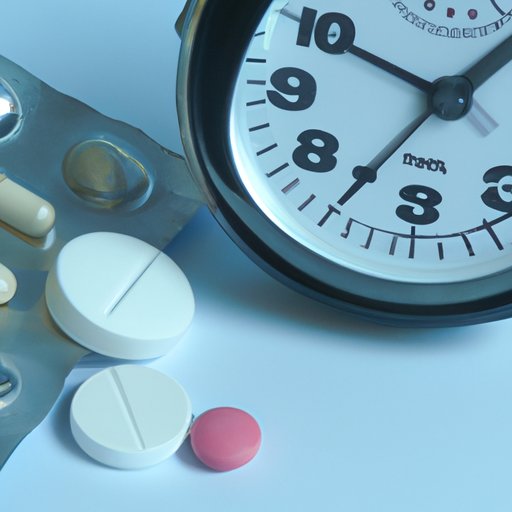
Introduction
Managing blood pressure is critical for overall health, and medication is often a key component of treatment. However, taking medication as directed can be challenging, especially when it comes to determining the best time of day to take it. In this article, we will explore the benefits, factors, and tips for timing blood pressure medication to provide the most effective management of blood pressure.
Benefits of Taking Blood Pressure Medication at Night
Recent studies suggest that taking blood pressure medication at night may provide extra benefits. For example, a Spanish study published in the Journal of the American Society of Nephrology found that those who took at least one of their blood pressure medications at bedtime had a lower risk of heart attack and stroke. This schedule also resulted in better blood pressure control than those who took all their medication in the morning. Moreover, taking medication before going to bed may be more effective at reducing blood pressure when compared to taking medication at other times of the day.

Understanding the Circadian Rhythm: Ideal Time for Blood Pressure Medication
Our bodies have an internal “clock” known as the circadian rhythm that regulates many bodily functions, including blood pressure. Blood pressure tends to be lower during the night, but it rises in the morning. Therefore, timing blood pressure medication to coincide with this rhythm can be more effective at managing blood pressure and reducing the risk of complications.
Early Morning vs. Bedtime Blood Pressure Medication: Which is Better?
In the morning, hormone levels are elevated, and the body is preparing for a day of activity, including an increase in blood pressure. Therefore, taking medication in the morning may help blunt this rise in blood pressure. Taking medication at night, on the other hand, may be more effective at reducing blood pressure during sleep and improving overall blood pressure control.
The best timing for medication also depends on the type of medication. Diuretics and ACE inhibitors are often more effective in the morning, while calcium channel blockers and beta-blockers work better when taken at night. A healthcare provider can advise on the best timing based on the individual’s medication regimen and health condition.
How to Determine the Best Time to Take Your Blood Pressure Medication
Several factors should be considered when deciding on the best time to take blood pressure medication. These include the type of medication, the individual’s work schedule, and lifestyle factors. For example, taking medication before work may be challenging for shift workers who have a non-traditional work schedule. Consulting with a healthcare provider can help determine the best timing and schedule for an individual’s needs.
It may also be helpful to track blood pressure readings throughout the day to determine if medication timing needs to be adjusted.
The Importance of Consistency: Follow the Right Schedule for Your Blood Pressure Medication
Consistency is critical in managing blood pressure effectively. Skipping medication or taking it at inconsistent times can result in elevated blood pressure and increased risk of heart attack and stroke. Therefore, it is important to develop a routine and stick to it, even on weekends and holidays.
It may be helpful to set reminders on a phone or calendar to ensure that medication is taken on time and consistently.
What to Consider When Deciding on a Blood Pressure Medication Schedule
Several factors should be considered when deciding on the right medication schedule, such as side effects and medication interactions. Some medications may cause drowsiness or other issues that can affect work or other daily activities, so it may be necessary to adjust the timing of medication to reduce these effects.
Additionally, it is essential to be aware of medication interactions that could impact blood pressure. For example, nonsteroidal anti-inflammatory drugs (NSAIDs), such as ibuprofen, can reduce the effectiveness of some blood pressure medications.
Reducing Cardiovascular Risk: How Timing Your Blood Pressure Medication Can Help
Timing blood pressure medication correctly can help reduce the risk of cardiovascular complications, such as heart attack and stroke. Better blood pressure control can also improve overall cardiovascular health. Therefore, it is essential to take medication as directed, at the right time, and consistently.
Conclusion
Timing blood pressure medication correctly can provide significant benefits in managing blood pressure and reducing the risk of complications. The ideal timing will depend on individual factors, such as the type of medication and work schedule, and should be discussed with a healthcare provider. With consistency and attention to medication scheduling, blood pressure can be effectively managed to maintain overall health.


